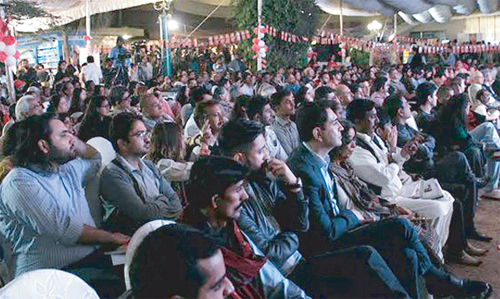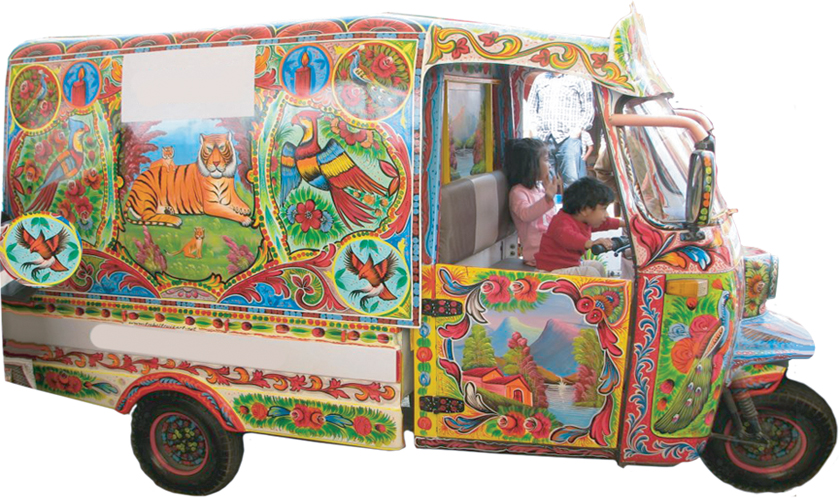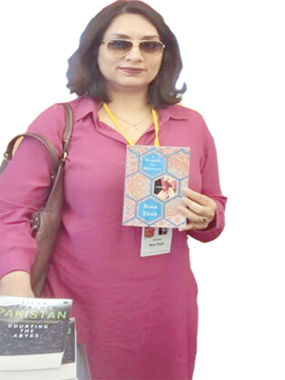Sights and Sounds from the KLF 2017
‘Sorry, you can’t sit here. These seats are reserved! ’Remember when you were in school and always sat next to your best friend? You were so attached to him/her that the mere thought of someone else sitting beside you gave you nightmares. Even outside the classroom, you sat together be it a match, a seminar or any other kind of congregation and always reserved a seat for him/her, not letting anyone else occupy it.

For most of us, that period of ‘reserving seats’ has long passed. We have grown up and don’t occupy seats for our friends who have not shown up on time. Unfortunately, some of us still have a lot of growing up to do and the concept of reaching somewhere on time is completely lost on them.
This was repeatedly seen at the Karachi Literature Festival 2017 where people occupied seats next to them for their friends/family members who were late, much to the annoyance of those who reached the venue on time but unfortunately didn’t have friends who could reserve seats for them. Ladies bags, mobile phones, copies of KLF schedule, etc placed on seats to occupy them was a common sight in many sessions, especially those with high-profile speakers. In some cases, people occupied four to five seats for their friends.
The rule of first come should be strictly applied to the literature festival and not the rule of whose friends/relatives come first.
Celebrity Watch
For a commoner like myself, the festival is a godsend as one gets to see so many writers, artists, journalists and prominent personalities under a roof. Seeing in person literary giants such as Mushtaq Ahmed Yousufi, Mustansar Hussain Tarrar and Zehra Nigah, to name a few, is a different experience altogether. The plus point is, you can actually go up to them and talk to them since they are quite accessible and polite (most of the time). Also, it’s not just local celebrities but also international figures who grace the event, so there is a great chance that you may end up meeting (or just seeing) your favourite actor from across the border or a renowned journalist of the New York Times.

Food for thought... and stomach
The small food court at the KLF offered much variety. In addition to the usual burgers, fries and biryanis there were also crepes and waffles available at very reasonable prices. But what stole the show (for me, at least) was the stall offering Parsi cuisine. The two enterprising gentlemen sitting at the stall did an excellent job of selling their ware by suggesting food options people might like and encouraging them to try new things. Their patra fish (lightly seasoned steamed fish wrapped in banana leaves) was no doubt tasty.
The food court also did a good job of humanizing our celebrities; isn’t it a delightful sight to watch your favourite writer/actor eat, with sauces dribbling down his/her chin? Stalking it may be counted as, but it was amusing, nonetheless.
Sleeping beauties
While the sessions were amazing, the speakers and moderators very knowledgeable, and their discussions informative, some just couldn’t take so much of it and kept falling asleep during sessions, especially during the morning sessions. Yours truly had the unfortunate honour of sitting next to a gentleman who couldn’t keep his eyes open and was continuously falling to his left and right.
Diversified audience
It wouldn’t be wrong to say that the Karachi Literature Festival is a microcosm of Karachi. You can see people belonging to all strata of society roaming the venue. While the uber-elite, English-speaking class is there, people from less-privileged areas of Karachi are also in attendance. Moreover, people of all age groups are found at KLF. It was good to see a number of old couples (some were very old) recalling the days of yore in the session with Shabnam.
It was also heartening to note the presence of schoolchildren, accompanied by their teachers. While the initiative of introducing school students to the concept of literature festivals such as KLF is laudable, their teachers must ensure that they attend the sessions of their interest and don’t create disturbance in sessions where they are ‘forced’ to sit.
The writer teaches at Bahria University, Karachi Campus
Fiction: the world over
By S.Z
Sehba Sarwar: Can a writer uncover truth and create dialogue across borders and between communities? There’s always an obligation that comes with where you come from to tell the story and what if you choose not to tell that story and do something different?
Andrea Berrini (Italy): I’m a fiction writer and somehow I’m inventing a new reality because I don’t tell the complete truth of [the protagonist]. What is in your book is absolutely your point of view on a certain reality and you have to be honest, in my opinion.
Mirza Waheed (Kashmir): If you come from a difficult place, the choice doesn’t exist. We grew up watching a lot of Bollywood representation of Kashmir, which was essentially rubbish. I wrote my first novel in 2006 or 2007, and I did not have a choice to write about lakes and rivers and the beauty because I have grown up with enormous violence not just around me but right outside my kitchen window. So, if you grow up and you have the sensibility, that is exactly what you’re going to write about.
Ibrahim Waheed (Maldives): As writers, we sometimes hold ourselves responsible for what happens in society. It would be a very good idea that we leave to our great-great-grand-kids what we thought, what we saw, what we experienced with our five senses.
Bina Shah (Pakistan): The role of the writer is to tell stories and I feel that we romanticize the writer so much that we forget about the story. We tell stories to our children from almost the day they’re born, we tell them the story of the day they were born, and then make up stories. Maybe you look to religion or maybe you look to science. So stories really start as the building blocks of our psychology and of our society.
Everybody has stories to tell and everybody’s story is as important as the next person’s. You anoint us as “writers” and we feel much more magical, much more mystical than the rest of you. So you start as a young writer with a very egoistical idea that you are going to reveal a genius personality to the world and once you get that out of the way, you realize that your goal is only to connect; you’re only trying to connect ... connect to your readers, connect your readers to each other and readers to the world of stories and stories to stories. You’re the spider that’s spinning the web.
Paul Veyret (France): We are social creatures; therefore, we tell stories. Also, we have to accept that, for example in a relationship with fiction, there’s nothing really original about stories. Everything has already been said in other words; “I love you” is the world’s most quoted sentence.